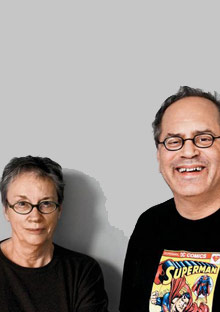The Consummate Reader

Photo: Gregg Lewis/Courtesy of KCRW
PAGE 2
He wanted to be a writer, bad. Do, or die—he enrolled in a PhD program in English at Johns Hopkins University. He lasted a year. "I was not a scholar," he says. "But I was a passionate student." Yet writer's block left him paralyzed: "I thought I wanted to be a writer, but that really didn't turn out to be my gift." This is the devastating stuff of life.
So he split, headed west, tried his hand at screenwriting in Hollywood. Then he lost himself, in the various ways people do once they've followed the rabbit into the hole in search of a life less ordinary. He was broke, jobless, and drinking too much. "At the time, I resembled a homeless person who unaccountably had an apartment," he says.
Friends in a support group dug him out, helped him find a job in what felt like the least likely occupation—public relations. He was at a dinner in Santa Monica representing the actor Ray Sharkey, who played a villain on the TV show Wiseguy, when he found himself sitting next to Ruth Seymour, who had just returned from Russia. She and Michael struck up a conversation about Russian poetry. Impressed by his passion, knowledge, and acumen, she asked him if he'd host a book show.
He hesitated; she prodded: "You know, we're not murdering children here, Michael, we're just doing radio."
Holden Caulfield said: "What really knocks me out is a book that, when you're all done reading it, you wish the author that wrote it was a terrific friend of yours and you could call him up on the phone whenever you felt like it." That's pretty much what Michael does with writers, except he invites them over—to his sound studio the size of your bathroom, where they sit eye-to-eye across from each other at a desk. He doesn't need notes; he's read (and probably reread) everything by them and everything about them.
In an adjacent studio, sound engineer Mario Diaz records the interviews. He's surrounded by three monitors, a couple of speakers, a mixing board, and an equalizer. Nearby, he keeps his collection of "homies," plastic Latino figurines bought for 50 cents in vending machines.
"That one looks like Cher," I tell him.
"No, that's a chola!" Diaz says.
Bookworm's coproducer, Melinda Siegel, who describes her job as "kind of like being a mom," sits next to us. "Mario's really good at dealing with any eventuality without hysteria," she says.
"Hidden hysteria," says Diaz.
A lot can happen in a room where two people tell the truth. In an interview edging on evasive, poet Sharon Olds delicately hedged her answers until Michael told her a personal experience he'd had with abuse. She said, "Give me your hand. There you go. There you go." And then Olds opened up about dealing with emotionally difficult material. [Listen to the interview here ]
]
So he split, headed west, tried his hand at screenwriting in Hollywood. Then he lost himself, in the various ways people do once they've followed the rabbit into the hole in search of a life less ordinary. He was broke, jobless, and drinking too much. "At the time, I resembled a homeless person who unaccountably had an apartment," he says.
Friends in a support group dug him out, helped him find a job in what felt like the least likely occupation—public relations. He was at a dinner in Santa Monica representing the actor Ray Sharkey, who played a villain on the TV show Wiseguy, when he found himself sitting next to Ruth Seymour, who had just returned from Russia. She and Michael struck up a conversation about Russian poetry. Impressed by his passion, knowledge, and acumen, she asked him if he'd host a book show.
He hesitated; she prodded: "You know, we're not murdering children here, Michael, we're just doing radio."
Holden Caulfield said: "What really knocks me out is a book that, when you're all done reading it, you wish the author that wrote it was a terrific friend of yours and you could call him up on the phone whenever you felt like it." That's pretty much what Michael does with writers, except he invites them over—to his sound studio the size of your bathroom, where they sit eye-to-eye across from each other at a desk. He doesn't need notes; he's read (and probably reread) everything by them and everything about them.
In an adjacent studio, sound engineer Mario Diaz records the interviews. He's surrounded by three monitors, a couple of speakers, a mixing board, and an equalizer. Nearby, he keeps his collection of "homies," plastic Latino figurines bought for 50 cents in vending machines.
"That one looks like Cher," I tell him.
"No, that's a chola!" Diaz says.
Bookworm's coproducer, Melinda Siegel, who describes her job as "kind of like being a mom," sits next to us. "Mario's really good at dealing with any eventuality without hysteria," she says.
"Hidden hysteria," says Diaz.
A lot can happen in a room where two people tell the truth. In an interview edging on evasive, poet Sharon Olds delicately hedged her answers until Michael told her a personal experience he'd had with abuse. She said, "Give me your hand. There you go. There you go." And then Olds opened up about dealing with emotionally difficult material. [Listen to the interview here
Please note that Harpo Productions, Inc., OWN: Oprah Winfrey Network, Discovery Communications LLC and their affiliated companies and entities have no affiliation with and do not endorse those entities or websites referenced above, which are provided solely as a courtesy. Please conduct your own independent investigation (including an investigation as to whether any contributions are tax deductible) before donating to any charity, project or organization. This information is provided for your reference only.



